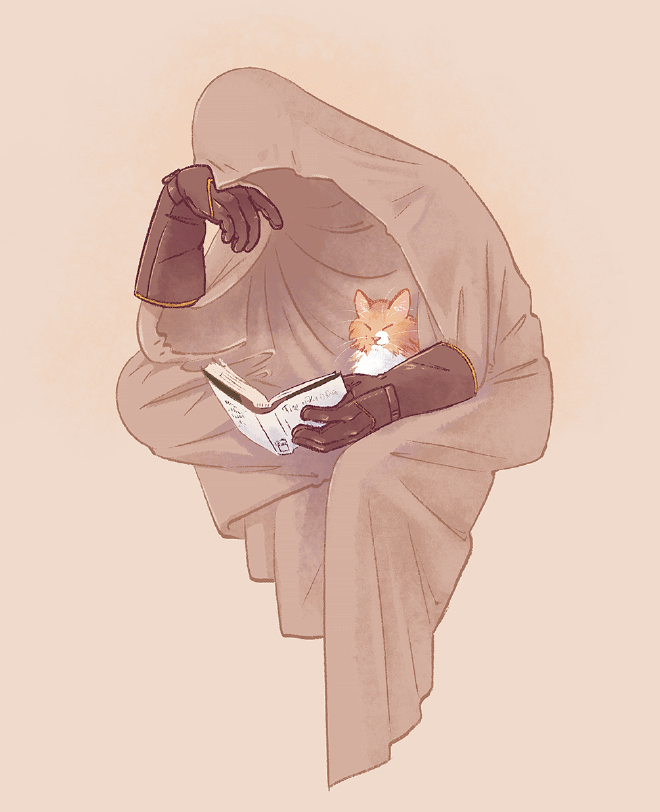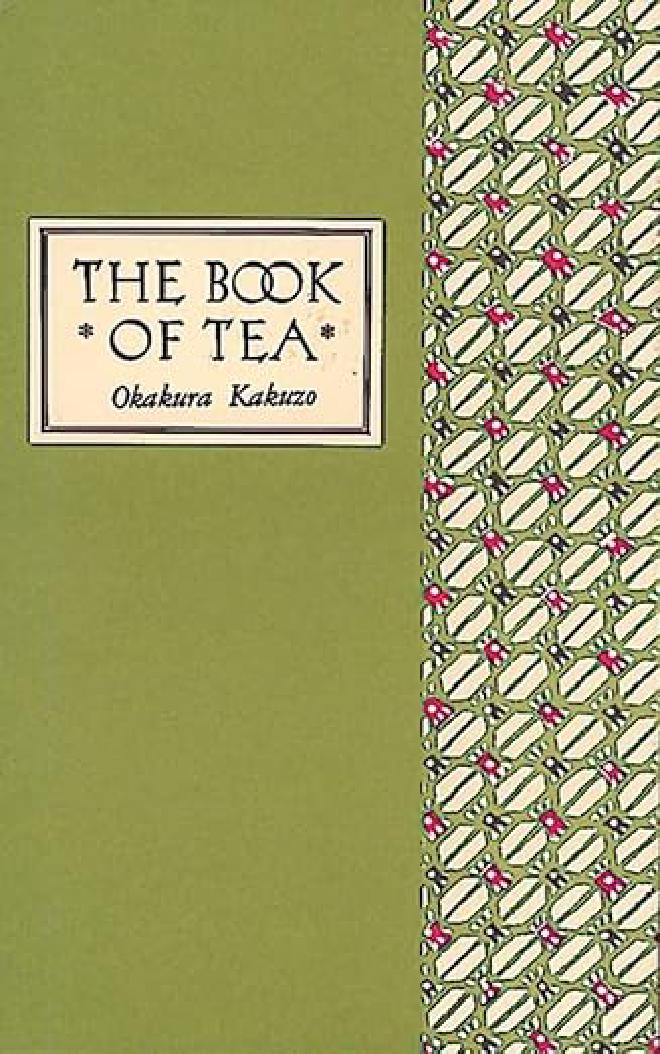Intro #
A friend of mine recommended we read this book together during the month of November in 2024 as a sort of 2-person book club. I failed at finishing it before the end of November but here at last I’ve completed it; all that was missing was me to give it completeness.
Thank you for committing me to read a book I already had in my possession. Here are some of the things I’ve taken away from it.

Buy the book yourself! #

A few thoughts #
Nature leaves no organism without its defenses, save maybe flowers as Okakura says in this book. The same is the case, to me at least, with any culture or group of people that in general are considered to be gentle. They are not ever purely docile, they will always defend themselves in some way.
Okakura goes against the grain of the typical stereotype of the gentle Japanese and for that I’m glad. He functions to defend the Japanese culture against forces that I’d argue are surreptitiously eroding away many cultures. I know in his own time and in his book he saw it as two dragons, East and West, in battle with each other. It makes me wonder what he would say has become of his Japanese culture now. What would he think of this modern era?
Maybe I’m imagining it, but the more technologically advanced or affluent certain parts of the world become, the more they start to resemble each other. Go to any decently developed city and you’ll find a Starbucks or a localized coffee shop that looks like one. You might see a quaint shopping mall with a Forever 21, Zara, or other well known brands like Uniqlo, Muji, and Patagonia.
In his book Okakura defends the Japanese culture and worldview and even shows examples of how it has launched an offensive on the West; the West has willingly welcomed the tea invasion. If he were alive today, would he be proud of his culture because in many ways Japanese culture has made even deeper inroads into the Western world with sushi, ramen, mochi, gyoza, street foods, and anime. I even bought a Japanese inspired kimono robe in México for tea’s sake! Isn’t that something?
Besides being a wonderful defense of a the culture, it is also a great presentation of what tea can really be and all the things around it that make it more than just a cup full of water.
Favorite Quotes #
The quotes below are arranged by the chapter and page number they appeared within the book. If you have a copy feel free to try and find it yourself.
Forward #
This situation was aggravated by Okakura’s own pronouncements, for he possessed in no small measure “the gentle art of making enemies.”
– page xii
I wonder if I should cultivate the gentle art of making enemies. Making an enemy is hard for me. Gently making an enemy might be even more challenging.
The Cup of Humanity #
Perhaps I betray my own ignorance of the Tea Cult by being so outspoken. Its very spirit of politeness exacts that you say what you are expected to say, and no more.
– page 9
Hahaha. I laughed at this. It brings to light the internal conflict within the author. He might very well want to be polite but he knows his life mission summons him for something else. Politeness must be sacrificed.
Charles Lamb, a professed devotee, sounded the true note of Teaism when he wrote that the greatest pleasure he know was to do a good action by stealth, and to have it found out by accident.
– page 14
Huh? This vaguely reminds me of something I heard on a podcast with Jordan Peterson once. He said something like this: “One of my clients discovered that people will let you do whatever you want so long as you don’t want to take credit for it.”
And so it is that on a few occasions I have had the joy of leaving an easter egg in the world with no expectation that it will be discovered, and that if it is, that I will not be given adulation for it. It’s one of the best ways that I’ve found of trapping happiness in my heart and lighting a secret lantern within that lights my way.
The Taoists relate that the the great beginning of the No-Beginning, Spirit and Matter met in mortal combat. At last the Yellow Emperor, the Sun of Heaven, triumphed over Shuhiung, the demon of darkness and earth. The Titan, in his death agony, struck his head against the solar vault and shivered the blue dome of jade into fragments. The stars lost their nests, the moon wandered aimlessly among the wild chasms of the night. In despair the Yellow Emperor sought far and wide for the repairer of the Heavens, He had not to search in vain. Out of the Eastern sea rose a queen, the divine Niuka, horn-crowned and dragon-tailed, resplendent in her armour of fire. She welded the five-coloured rainbow in her magic cauldron and rebuilt the Chinese sky. But it is also told that Niuka forgot to fill two tiny crevices in the blue firmament. Thus began the dualism of love – two souls rolling through space and never at rest until they join together to complete the universe. Everyone has to build anew his sky of hope and peace.
– page 15
I only need to preserve the last sentence: “Everyone has to build anew his sky of hope and peace.” However, this mythical story of beginning was so short and inspiring to me that I wanted to write it down in its entirety.
To build anew implies to have first been destroyed.
That sounds right.
The world is groping in the shadow of egotism and vulgarity. Knowledge is bought through a bad conscience, benevolence practised for the sake of utility.
– page 16
Benevolence practiced for the sake of utility. Maybe that’s why I like the quote above about not taking credit for a good action. I always wonder what it is about openly benevolent people that make it a point that others know how benevolent they are. If anything, the show and attention instinctively make me think they are benevolent in public but in private they are some form of wicked.
Truly patient people wait, they do not make a show of waiting.
Truly benevolent people give, they do not it not to gain.
Truly beautiful things don’t deliberately ask for attention.
Let us dream of evanescence, and linger in the beautiful foolishness of things.
– page 17
Let us linger as long as we can without hurting our chances of being able to come back. Let us be responsible enough, and only enough, to keep lingering in the beautiful.
Has this become a new life motto of mine? No one says “I wish I had worked more” when on their death bed, or so I keep hearing in a weird life lesson adage form. Yet, I must work in some way regardless of if I enjoy it or not so that I may linger as long as possible before working again.
The Schools of Tea #
Lichihlai, a Sung poet, has sadly remarked that there were three most deplorable things in the world: the spoiling of fine youths through false education, the degradation of fine paintings through vulgar admiration, and the utter waste of fine tea through incompetent manipulation.
– page 20
:-) Hahaha. The funniest piece here to me is the ‘vulgar admiration’. Who knows what that means exactly but it was entertaining to read.
Taoism and Zennism #
It is to be regretted that as yet there appears to be no adequate presentation of the Taoist and Zen doctrines in any foreign language, though we have had several laudable attempts.
Translation is always a treason, and as a Ming author observes, can at its best be only the reverse side of a brocade, – all the threads are there, but not the subtlety of colour or design.
– page 36
I wholeheartedly disagree with you Okakura. Translation is not always a treason. It can be better than the original. Good writing is hard work, and so is good translation. Good reading is hard work as well because each reading is itself a translation of what the author meant and what the reader understands.
I think in truth Okakura talks more about the limitations of the translators. I did enjoy use of visual language with the brocade.
Laotse himself, with his quant humour, says, “If people of inferior intelligence hear of the Tao, they laugh immensely. It would not be the Tao unless they laughed at it.”
– page 37
Hahahaha, then I have gotten dumber over the years because now I seem to want to laugh more. It’s also possible that I didn’t know how to laugh well to begin with.
Education, in order to keep up the mighty delusion, encourages a species of ignorance. People are not really taught to be really virtuous, but to behave properly. We are wicked because we are frightfully self-conscious. We never forgive others because we know that we ourselves are in the wrong. We nurse a conscience because we are afraid to tell the truth to others; we take refuge in pride because we are afraid to tell the truth to ourselves. How can one be serious with the world when the world itself is so ridiculous.
– page 41
Virtuosity cannot be taught but it doesn’t stop people from teaching the hints of virtuosity. Today’s world would call this ‘virtue signaling’; it’s the act of signaling I am virtuous or possess virtue but that at the core I am hollow.
I wish to avoid this sort of virtue that I call the imitation bias. It’s the idea that by copying someone I shall somehow acquire the inner qualities they posses that lead to those behaviors. I don’t want to lie to you, reader, but I am guilty of imitation bias. I can see that it can lead to exposing virtue that might have already been there but was not exposed due to cowardice. I have yet to determine if it can lead to developing virtue that has never existed in any measure.
Why do men and women like to advertise themselves so much? Is it not but an instinct derived from the days of slavery?
– page 42
Ah wow. A truly timeless observation in my opinion. Where might it be that he saw men and women advertising themselves into slavery? What did he mean by slavery?
To me it rings of social media: twitter, instagram, tiktok, etc. It reminds me of a time where I realized that I didn’t know how to use social media and caught myself, luckily, and stopped. I was posting in the hopes of attention and it was the wrong way of posting.
I haven’t taken to social media again since that time because I still have to learn how to use it correctly. It’s a bit paradoxical but my current rule is that if I feel the need to post, I shouldn’t, and if I don’t feel the need to post that I should. In both cases, my social media audience ends up with nothing and I end up keeping the memory.
One master defines Zen as the art of feeling the polar star in the southern sky. Truth can be reached only through the comprehension of opposites.
– page 49
Multiple people have explained the concept of “Not Either-Or, But Both-And” and the simple reference to non-duality it represents. I’ve heard it used enthusiastically in the manner of “it’s both and isn’t that great?”, or it in the manner of “it’s both and you have to deal with the consequences of each”.
When used enthusiastically, I can get behind it, but I think
I’ve found a better way of expressing this to myself:
It’s the polar star in the southern sky.
Now isn’t that amazing?
One day Soshi was walking on the bank of a river with a friend. “How delightfully the fishes are enjoying themselves in the water!” exclaimed Soshi. His friend sake to him thus: “You are not a fish; how do you know that the fishes are enjoying themselves?”
“You are not myself,” returned Soshi; “how do you know that I do not know that the fishes are enjoying themselves?”
– page 50
Hahahaha. I’m sure there is some lesson in here about “walking in someone else’s shoes” or about “assuming makes an ass out of u and me” or “he who knows, knows, and those that don’t wonder and gawk” but I couldn’t help but just laugh at the response and keep reading.
The Tea-room #
One cannot listen to different pieces of music at the same time, a real comprehension of the beautiful being possible only through concentration upon some central motive.
– page 68
Surely there are those that would disagree with this, but I find myself a supporter of this idea. I see the most beauty when I attend to a single focus and all else falls away.
True beauty could be discovered only by one who mentally completed the incomplete.
– page 70
Ah! What a discovery this was to think of Art in this way. There is beauty in art because my mind completes its beauty. I am the missing element that offers it completeness. I like this idea as opposed to the idea that beauty exists without my needing to witness it.
In Western houses we are often confronted with what appears to us useless reiteration. We find it trying to talk to a man while his full-length portrait stares at us from behind his back.
– page 72
Hahaha. Another good jest from Okakura. It’s hilarious to go into the homes of people and see photos of them on the wall as I walk up and down stairs. It is strange to go to my parents’ home and see photos of my younger self staring back at me. There is something sentimental about the photos, I understand why we do it, yet it’s funny all the same.
Flowers #
Said Kōbō Daishi: " Flow, flow, flow, flow, the current of life is ever onward. Die, die, die, die, death comes to all." Destruction faces us wherever we turn. Destruction below and above, destruction behind and before.
– page 99
It’s very soothing to me to read this. I was telling to a friend once that on the days I feel brave enough to die, brave enough to smile at it and taunt it to come forward, I am happy.
I couldn’t quite get the idea across. I fear it came across as me being some flavor of suicidal, which I am not.
Maybe I can correct myself here. It is on the days that most feel like life is a treasure and that I want to live it to the fullest that I fear death the least and so welcome it the most.
Whichever way you think about it, with destruction comes the opportunity for renewal, like in the legend of queen Niuka and the rebuilding of the sky Death is everywhere, even if you don’t literally die. How will I rebuild my sky?
Tea-masters #
The tea-master held that real appreciation of art is only possible to those who make of it a living influence. Thus they sought to regulate their daily life by the high standard of refinement which obtained in the tea-room.
In all circumstances serenity of mind should be maintained, and conversation should be so conducted as never to mar the harmony of the surroundings. The cut and colour of the dress, the poise of the body, and the manner of walking could all be made expressions of artistic personality.
These were matters not to be lightly ignored, for until one has made himself beautiful he has no right no approach beauty.
– page 109
I like that final part about making oneself beautiful to gain the right to approach beauty. I can’t say for certain that I believe in the statement, but I do find it to be very well said nonetheless.
Those of us who know not the secret of properly regulating our own existence on this tumultuous sea of foolish troubles which we call life are constantly in a state of misery while vainly trying to appear happy and contented.
We stagger in our attempt to keep our moral equilibrium, and see forerunners of the tempest in every cloud that floats on the horizon. Yet there is joy and beauty in the roll of the billows as they sweep outward toward eternity. Why not enter into their spirit, or, like Liehtse, ride upon the hurricane itself?
– page 113
Yes! Let’s ride that hurricane! It has to end somewhere, sometime. And then we rest until it starts up again.
Never again shall this cup, polluted by the lips of misfortune, be used by man." He speaks, and breaks the vessel into fragments.
With a smile upon his face Rikiu passed forth into the unknown.
– page 116
Hahahaha. What a way to go. This is how master Rikiu died. He knew he was dying, as all great masters of Zen do. I like his final act of breaking the cup to deny anyone else the opportunity of drinking from a cup he poisoned by his own lips. It’s either that or it was his favorite cup in the world and couldn’t bear anyone else drinking from it. Why else would he smile if not because he felt content knowing he was victorious in being the last person to drink from his favorite vessel? Maybe it sounds like something I would do and that’s why I smile too.
